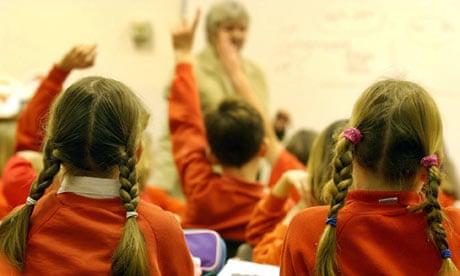Tens of thousands of seven-year-olds are struggling to master the three Rs, official figures show.
The new statistics reveal that after three years of schooling many children can read only the easiest words, such as "cat" or "dog", and do the very simplest sums.
Almost 106,000 seven-year-olds have failed to reach level 2 – the standard expected of the age group – in writing.
More than 83,000 pupils have a reading age of a five-year-old or lower. And over 58,000 children are falling behind the expected standard in maths.
The figures, published by the Department for Education, are based on teachers' assessments of pupil achievement at the age of seven.
They show that 85% reached the expected level or higher in reading, 81% achieved it in writing, 90% made at least level 2 in maths and 89% reached it in science. These figures are broadly the same as last year.
The percentages of pupils achieving level 3 – one above the required standard – in each of these subjects has also remained static this year, except in science, where it dropped from 21% to 20%.
The statistics also show that boys are still lagging behind girls.
Nearly nine in 10 (89%) seven-year-old girls reached level 2 or higher in reading, compared with 82% of boys.
In writing, 87% of girls scored at least level 2 compared with three-quarters (76%) of boys, and in maths there was a gap of three percentage points, with 91% of girls achieving the expected level against 88% of boys.
Schools minister Nick Gibb says: "These figures show that many children are doing well. But it is worrying that there are still so many who are behind just three years into their school careers.
"Success in later life is founded on an understanding of the 3Rs in the first few years of school. Problems must be identified at a young age and rectified before it is too late."
There is also a gap in achievement between children from disadvantaged backgrounds and their more affluent classmates. Just two-thirds (67%) of pupils on free school meals (FSM) – a measure of poverty – reached level 2 in writing, compared with 85% of all other pupils.
And while 88% of all other pupils reached the expected standard in reading, the same was true for only 73% of children eligible for free dinners.
In maths, 81% of FSM pupils reached level 2 compared with 92% of other youngsters.
Gibb says: "The overriding objective of the government is to close the attainment gap between those from poorer and wealthier backgrounds.
"Today's key stage 1 figures, revealing that a third of boys eligible for free school meals are not reaching the expected level in reading, demonstrates the scale of the challenge and why tackling poor reading is such an urgent priority."
Meanwhile figures for older children show almost a fifth of children lagging behind in English and maths by the age of 11.
Statistics reveal that 18% of pupils in England have failed to make the progress expected of them in maths between the ages of seven and 11. A similar proportion (17%) have not made sufficient progress in English.
The gender gap grows in English, with boys falling further behind girls. But boys are outperforming girls in maths.
Overall 86% of girls made the expected progress in English compared with 81% of boys – a gap of five percentage points. Last year the gap was four percentage points.
In maths, 83% of boys made enough progress, against 82% of girls, a gap of one percentage point. In 2010 the gap was two percentage points.
Ministers have introduced a new target which will see primary schools labelled underperforming if fewer than 60% of their pupils reach level 4 in English and maths at age 11.

Comments (…)
Sign in or create your Guardian account to join the discussion